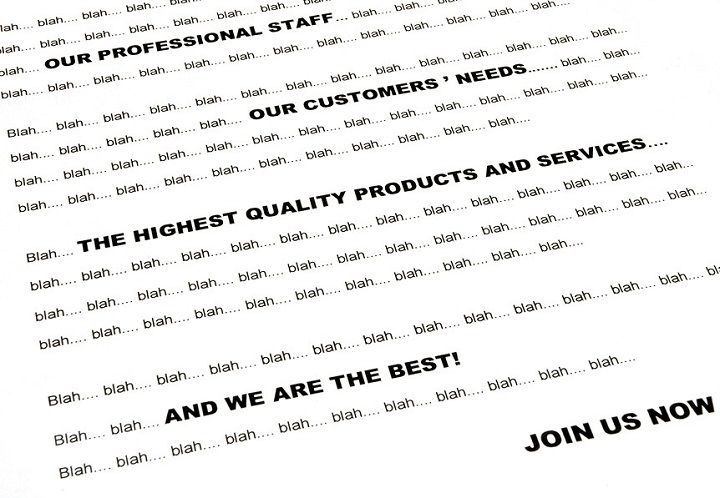Strategic Marketing Message or Words on a Page: Which Describes Your Website Content?

Lately, I’ve been receiving a bunch of requests to rewrite website content. Not as part of an overhaul of an ancient website, and not to account for recent organizational changes, but to simply replace content that’s no more than a year old.
Why is this happening? A few reasons…
- Content was pretty much an afterthought when the organization had their website built or redesigned. They invested in creating a functional, visually appealing website, but content was neglected.
- The business owner believed they should write the content themselves. Because their team knows the business better than anyone – and they all know how to type – they figured they were capable of and most qualified to write their own website content. And it would cut costs.
- The website developer or agency didn’t offer content writing as part of the package. They made it the responsibility of the client to provide content. Because, you know, the business owner and team know their company better than anyone and they can type. The developer or agency doesn’t like to get bogged down with content anyway. And it would cut costs.
- The business knowingly half-assed the content for the sake of expediency so they could take the website live sooner.
Regardless of the reason, each business or organization ended up with words on a page instead of a strategic marketing message.
Fortunately, these businesses that contacted me recognized the problem and took action to fix it. Unfortunately, many others don’t realize their website content is bad and wonder why the site isn’t producing leads or sales.
How to Reach a Verdict
Are you unsure if your website content delivers a strategic marketing message or is little more than words on a page? Beyond making sure your website clearly explains who you are, what you do, and the value you deliver, ask yourself these questions.
Does your website content sell the experience and results of doing business with you?
Because people don’t care about your tax services. They’ll remember how you treated them and helped them pay as little in taxes as the law allows.
Does your website content tell your story? Not “once upon a time,” but who you are as a business and how you make people’s lives better?
Because the cost of your legal services will be a lot easier to swallow when people see how you helped someone in a desperate situation receive the justice they deserved. When all other things are equal, your story could be the difference maker.
Does your website content weave your value proposition into your story in a way that’s understandable, relatable, and believable?
Because homeowners will be less likely to go to a big home improvement store for new hardwood floors after you’ve explained how you walk them through the process, from measurement and transparent pricing to choosing a style and installation.
Does your website content make a strong enough case to compel someone to pick up the phone, send an email, or fill out a form?
Because there are plenty of mortgage lenders out there. If your website content doesn’t differentiate you from the competition, people will keep looking.
Of course, the most important question is this:
Is your website generating leads and helping you make money?
Because your website content may wax poetic, but the goal isn’t to win creative writing awards. You need to see real business results.
Make Website Content a Priority. And Fix It if You Didn’t.
I didn’t write this article to call anyone out. I don’t expect you to stand up and say, “Guilty as charged! My website content stinks!”
Instead, I want you to view your website content as a critical component of your marketing strategy and online presence, not just words on a page. More often than not, the effectiveness of website content correlates with how much effort, research, objective analysis, and investment went into it.
Which is the smarter approach? Take shortcuts at the beginning, potentially leave money on the table, and spend more time and money rewriting your website content later? Or make website content a priority from day one so you have a strategic marketing message instead of words on a page?
Take a hard look at your website content and ask yourself the questions above. Ask an outsider who has no connection or emotional attachment to your organization to provide a brutally honest evaluation. Be honest about whether your website content would be accurately described as a strategic marketing message or words on a page.
If you learn your website content is weak, fix it. Hire someone if you don’t have the in-house talent for the job.
If you’re building or revamping your website, understand that written content is just as important as design, functionality, and user experience. Bring in a professional content writer to help you identify the right message and communicate it in a way that matters to your ideal client.
Even in an age of imagery and video, words matter. The right words matter. The strategy behind the words matters. Your story matters. Give them the attention they deserve.
Subscribe to my blog to receive insights and commentary about copywriting and marketing.
SIGN UP FOR MY BLOG
Thank you for subscribing to my blog!
Oops, there was an error sending your message. Please try again later.
I love testimonials, but only real-world, unfiltered client feedback tells the whole story.
© Scott McKelvey Consulting, LLC. All Rights Reserved. | Privacy Policy | Accessibility Statement

